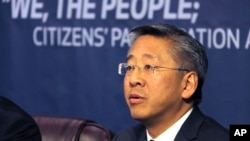The United States is "committed to working with Bangladesh to fight corruption," Donald Lu, U.S. assistant secretary of state for South and Central Asian Affairs, told VOA’s Bangla Service.
Lu visited Bangladesh in mid-May and met with senior government officials and civil society leaders. Shortly after his visit, the U.S. announced sanctions against former Bangladesh army chief General Aziz Ahmed for what it termed his involvement in “significant corruption.”
In an interview conducted by email on Monday, Lu spoke about topics that included economic cooperation, the climate crisis, women's rights and the commitment of the United States to work with the people of Bangladesh on issues of democracy and human rights. This interview has been edited for brevity and clarity.
VOA: In your recent visit to Bangladesh, you expressed the administration's intention to move beyond the tension between Bangladesh and the U.S., which was caused by your administration's initiative to promote democracy and a free, fair and peaceful election in Bangladesh in January this year. Is this an indication of a U.S. policy shift toward Bangladesh where you intend to focus more on geopolitical, economic, environmental and strategic bilateral issues rather than promoting democracy?
Donald Lu: As I said during my recent visit to Dhaka, we are looking forward, not back. We are ready and eager to advance our partnership with Bangladesh across a broad range of issues. We hope to continue deepening our trade ties with Bangladesh. We want to advance our shared interest in women's economic security. We are already working together to address the climate crisis. We are optimistic about the opportunities for continued partnership on our shared priorities.
Promoting democracy and human rights in Bangladesh remains a priority for us. We will continue to support the important work of civil society and journalists and to advocate for democratic processes and institutions in Bangladesh, as we do in countries around the world.
VOA: Opposition political parties in Bangladesh and sections of civil society have criticized the U.S. administration for being “soft” on the current government of Bangladesh regarding the January 7 election issues, which include human rights violations. How would you respond to this criticism?
Lu: The United States staunchly supports free and fair elections and is firmly committed to promoting respect for human rights. Throughout the election cycle, we regularly engaged with the government, opposition, civil society and other stakeholders to urge them to work together to create conditions for free and fair elections. We were outspoken in our condemnation of the violence that marred the election cycle and we have urged the government of Bangladesh to credibly investigate incidents of violence and hold perpetrators accountable. We will continue to engage on these issues.
VOA: In your recent visit, you did not meet with the representatives from the opposition parties who boycotted the election, although you met with members of the civil society. Why did you decide not to meet with the opposition members?
Lu: It is true that last year ahead of the elections I had the opportunity to meet with a roundtable of leaders from several political parties. It’s not a pre-election period, so I didn’t meet with political parties during this visit.
I was fortunate to meet with a diverse group of Bangladeshis while in Dhaka, from civil society representatives to government officials, to the Bangladesh National Women’s Cricket Team, who taught me a thing or two about bowling and batting.
VOA: You highlighted your government's plan to work together with Bangladesh to fight corruption and ensure financial good governance. Is the recent sanction against the former Bangladesh army chief General Aziz a part of that fight against corruption? Are you satisfied with the Bangladesh government's willingness to cooperate to mitigate these issues?
Lu: When I was ambassador to Albania and the Kyrgyz Republic, we sanctioned corrupt officials. This was not popular with the governments at the time, but now those sanctioned former corrupt officials are all in jail. Societies around the world are eager to see justice for corruption.
We are committed to working with Bangladesh to fight corruption, and on May 20, we announced the public designation of former General Aziz Ahmed under Section 7031(c), due to his involvement in significant corruption. We welcome statements by government ministers that this corruption allegation will be fully investigated.
VOA: You have offered Bangladesh authorities free real-time use of satellite data to monitor the impact of climate change. How has Bangladesh responded to this? Which areas, in your opinion, should be prioritized in the cooperation between the two countries regarding climate change?
Lu: I felt firsthand the impact of climate change during my visit to Dhaka in May as I sweltered alongside Bangladeshis in the extreme heat. We are committed to partnering with Bangladesh to address the climate crisis. We’re focused on building clean energy capacity, reducing greenhouse gas emissions in sectors like agriculture and power, and conserving ecosystems to maintain biodiversity and reduce vulnerability to climate change. Our discussions with Bangladeshi officials were extremely positive.
VOA: In what ways can Bangladesh play an important role in the U.S. government's Indo-Pacific policy? What are the priority areas where you seek Bangladesh government's cooperation?
Lu: The United States and Bangladesh share a vision of an Indo-Pacific region that is free and open, connected, prosperous, secure and resilient. With a dynamic and fast-growing economy, Bangladesh is positioned to act as a bridge for commerce and an anchor for prosperity in the region. We’re focused on working with our Bangladeshi partners to boost inclusive economic growth in the region, as well as increasing security cooperation, addressing the climate crisis, and promoting democracy and human rights. Coordination on these and other issues benefits the people of both of our countries.









